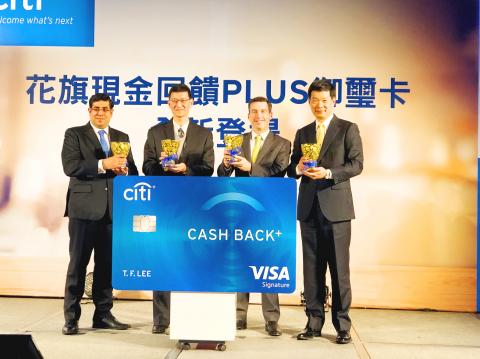With most Taiwanese using cash-back cards as their primary credit card, Citibank Taiwan Ltd (台灣花旗) yesterday introduced a new credit card with up to 3 percent cash back for new customers.
Citibank Taiwan, which began operations in the nation 55 years ago and has offered credit cards for 30 years, said it launched the Citi Cash Back Plus Card to beef up its offerings amid fierce competition in the domestic market.
Although the bank has offered similar cards for more than 15 years, providing up to 1.5 percent cash back, the latest credit card offers up to 3 percent to attract new clients, it said.

Photo: Kao Shih-ching, Taipei Times
“So far, cash-back rebate is one of the most popular credit card reward pillars for Taiwanese consumers,” Citibank Taiwan consumer business manager Dennis Hussey said.
A survey of 600 credit-card users aged 25 to 55 found that 85.7 percent have cash-back cards, the highest among all types of credit cards, followed by reward-point credit cards at 67.5 percent and other types at 37.5 percent.
The survey found that 72.7 percent of cardholders use cash-back cards as their primary credit card, he added.
While many local banks offer a cash-rebate program, Citibank Taiwan said it is confident that it offers better rewards, as it has higher rebates for everyday spending categories, lifelong rewards points and no minimum spending requirements.
New cardholders can earn NT$3 in cash rebates for every NT$100 they spend at restaurants, supermarkets and gas stations, Citibank Taiwan senior vice president Walkings Lee (李吉彬) said.
They can also earn cash when “autoloading” their EasyCards, which is rarely offered by other banks, as Citibank aims to deliver a superior experience for new cardholders, he said, referring to a process that automatically charges a user’s credit card to add value to an EasyCard.
Cardholders can redeem cash rewards when paying their monthly bills or exchange them to pay for parking at a better rate, Lee said.
Citibank Taiwan said that it pioneered the cash-back reward system and issued the nation’s first cash-back platinum card, which has been immensely popular in the market and set a good example for the industry.
Due to changes in the credit-card market, Citibank Taiwan said that it has once again increased its cash-back reward benefits.

Hon Hai Precision Industry Co (鴻海精密) yesterday said that its research institute has launched its first advanced artificial intelligence (AI) large language model (LLM) using traditional Chinese, with technology assistance from Nvidia Corp. Hon Hai, also known as Foxconn Technology Group (富士康科技集團), said the LLM, FoxBrain, is expected to improve its data analysis capabilities for smart manufacturing, and electric vehicle and smart city development. An LLM is a type of AI trained on vast amounts of text data and uses deep learning techniques, particularly neural networks, to process and generate language. They are essential for building and improving AI-powered servers. Nvidia provided assistance

DOMESTIC SUPPLY: The probe comes as Donald Trump has called for the repeal of the US$52.7 billion CHIPS and Science Act, which the US Congress passed in 2022 The Office of the US Trade Representative is to hold a hearing tomorrow into older Chinese-made “legacy” semiconductors that could heap more US tariffs on chips from China that power everyday goods from cars to washing machines to telecoms equipment. The probe, which began during former US president Joe Biden’s tenure in December last year, aims to protect US and other semiconductor producers from China’s massive state-driven buildup of domestic chip supply. A 50 percent US tariff on Chinese semiconductors began on Jan. 1. Legacy chips use older manufacturing processes introduced more than a decade ago and are often far simpler than

STILL HOPEFUL: Delayed payment of NT$5.35 billion from an Indian server client sent its earnings plunging last year, but the firm expects a gradual pickup ahead Asustek Computer Inc (華碩), the world’s No. 5 PC vendor, yesterday reported an 87 percent slump in net profit for last year, dragged by a massive overdue payment from an Indian cloud service provider. The Indian customer has delayed payment totaling NT$5.35 billion (US$162.7 million), Asustek chief financial officer Nick Wu (吳長榮) told an online earnings conference. Asustek shipped servers to India between April and June last year. The customer told Asustek that it is launching multiple fundraising projects and expected to repay the debt in the short term, Wu said. The Indian customer accounted for less than 10 percent to Asustek’s

Gasoline and diesel prices this week are to decrease NT$0.5 and NT$1 per liter respectively as international crude prices continued to fall last week, CPC Corp, Taiwan (CPC, 台灣中油) and Formosa Petrochemical Corp (台塑石化) said yesterday. Effective today, gasoline prices at CPC and Formosa stations are to decrease to NT$29.2, NT$30.7 and NT$32.7 per liter for 92, 95 and 98-octane unleaded gasoline respectively, while premium diesel is to cost NT$27.9 per liter at CPC stations and NT$27.7 at Formosa pumps, the companies said in separate statements. Global crude oil prices dropped last week after the eight OPEC+ members said they would